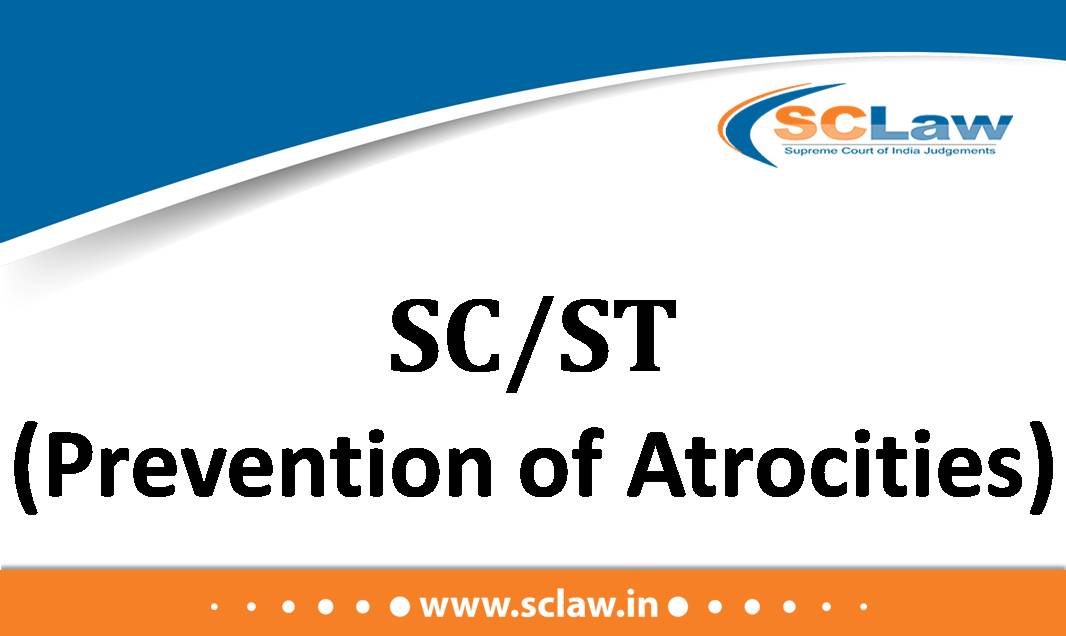Abkari Act, 1077 – Section 8 – Carrying 5 litres of illicit arrack – Conviction based solely on testimony of official witnesses – Delay in investigation – Testimonies of official witnesses can not be discarded simply because independent witnesses were not examined – Mere urging that delay casts a suspicion on the investigation, without any evidence being led in furtherance thereof, cannot be sustained
SUPREME COURT OF INDIA DIVISION BENCH SATHYAN — AppellantVs.STATE OF KERALA — Respondent ( Before : Abhay S. Oka and Sanjay Karol, JJ. ) Criminal Appeal No. 2363 of 2023…
Transfer of Property Act, 1882 – Sections 105, 106, 107 and 108 – Registration Act, 1908 – Sections 17 and 49 – Unregistered deed of lease for immovable property – In the absence of a registered instrument, the courts are not precluded from determining the factum of tenancy from other evidence on record as well as the purpose of tenancy In the present case, factum of creation of tenancy has been established – But the purpose of tenancy, so as to attract the six months’ notice period under Section 106 of the 1882 Act cannot be established by such evidence as in such a situation, registration of the deed would have been mandatory
SUPREME COURT OF INDIA DIVISION BENCH M/S PAUL RUBBER INDUSTRIES PRIVATE LIMITED — Appellant Vs. AMIT CHAND MITRA AND ANOTHER — Respondent ( Before : Aniruddha Bose and Vikram Nath,…
Constitution of India, 1950 — Article 32 — Writ jurisdiction — Violation of Fundamental Rights — A writ petition under Article 32 requires a prima facie case of violation or imminent threat of violation of a Fundamental Right, with specific pleadings and prayers for relief. Vague allegations of arbitrariness or violation of natural justice without specific impact on Fundamental Rights are insufficient to maintain the petition.
2025 INSC 884 SUPREME COURT OF INDIA FULL BENCH VISHNU VARDHAN @ VISHNU PRADHAN Vs. THE STATE OF UTTAR PRADESH AND OTHERS ( Before : Surya Kant, Dipankar Datta and…
Juvenile Justice (Care and Protection of Children) Act, 2000 — Applicability — Plea of juvenility raised for the first time before the Supreme Court — Permissible at any stage, even after disposal of the case, as held in various judgments of the Supreme Court.-— Determination of Age — Inquiry report confirmed the appellant was a juvenile (16 years, 2 months, 3 days) at the time of the commission of the offence.
2025 INSC 887 SUPREME COURT OF INDIA DIVISION BENCH SUA Vs. THE STATE OF RAJASTHAN ( Before : B.R. Gavai, CJI. and Augustine George Masih, J. ) Criminal Appeal No.2695…
Criminal Procedure Code, 1973 — Section 482 — Quashing of proceedings — High Court quashed proceedings under SC/ST Act, 1989, against respondents — Appellant contended High Court erred in exercising jurisdiction, overlooking evidence, and conducting roving inquiry — Court held High Court’s scope under Section 482 is limited to determining if allegations disclose a cognizable offence, and it should not engage in detailed evidence evaluation at pre-trial stage — However, if allegations are baseless, motivated by personal vendetta, or lack requisite ingredients for an offence, High Court can quash proceedings to prevent abuse of process.
2025 INSC 886 SUPREME COURT OF INDIA DIVISION BENCH KONDE NAGESHWAR RAO Vs. A. SRIRAMA CHANDRA MURTY AND ANOTHER ( Before : B.R. Gavai, CJI. and Augustine George Masih, J.…
Criminal Procedure Code, 1973 — Section 482 — Quashing of criminal proceedings — Second quashing petition — Maintainability — Not permissible to raise previously available grounds in a subsequent petition to effect a review of an earlier order, violating Section 362 CrPC — Exception is when there has been a change in circumstances.
2025 INSC 888 SUPREME COURT OF INDIA DIVISION BENCH M.C. RAVIKUMAR Vs. D.S. VELMURUGAN AND OTHERS ( Before : Vikram Nath and Sandeep Mehta, JJ. ) Criminal Appeal No(s). ….of…
DTAA, India-UAE, Article 5(1) — Permanent Establishment — Definition of “fixed place of business” — The definition of Permanent Establishment requires a fixed place of business through which the business of an enterprise is wholly or partly carried on. The key test is whether the place is “at the disposal” of the enterprise, meaning the enterprise has the right to use the premises to carry on its business. Factors like stability, productivity, and a degree of independence are also considered.
2025 INSC 891 SUPREME COURT OF INDIA DIVISION BENCH HYATT INTERNATIONAL SOUTHWEST ASIA LTD. Vs. ADDITIONAL DIRECTOR OF INCOME TAX ( Before : J.B. Pardiwala and R. Mahadevan, JJ. )…
Central Goods and Services Tax Act, 2017 — Section 129 — Detention, seizure and release of goods and conveyances in transit — Show cause notice — Payment of penalty — Obligation to pass final order — Where a show cause notice is issued under Section 129(3) of the CGST Act and the taxable person files objections against the proposed levy, the proper officer is duty-bound to pass a reasoned, speaking order under Section 129(3), even if the penalty is paid. Such an order is crucial for enabling the taxpayer to exercise their statutory right of appeal under Section 107 of the CGST Act.
2025 INSC 890 SUPREME COURT OF INDIA DIVISION BENCH M/S ASP TRADERS Vs. STATE OF UTTAR PRADESH AND OTHERS ( Before : J.B. Pardiwala and R. Mahadevan, JJ. ) Civil…
Criminal Procedure Code, 1973 (CrPC) — Section 174 — Inquiry by Police into cause of unnatural death — Requirement of fair and impartial investigation — Evidence considered — Inconsistencies in CCTV footage, suspicious medical findings, and failure to preserve crucial forensic evidence indicated failures in local investigation.
2025 INSC 893 SUPREME COURT OF INDIA DIVISION BENCH SUKDEB SAHA Vs. THE STATE OF ANDHRA PRADESH AND OTHERS ( Before : Vikram Nath and Sandeep Mehta, JJ. ) Criminal…
Criminal Procedure Code, 1973 — Section 156(3) — FIR Registration — Application to Magistrate without approaching Police/SP — While a Magistrate ought not ordinarily entertain an application under Section 156(3) CrPC directly without the informant having availed and exhausted remedies under Section 154(3) CrPC, the Magistrate is competent to direct FIR registration if allegations disclose cognizable offence — Such an order is not without jurisdiction and not vitiated on this count, but it is a procedural irregularity.
2025 INSC 895 SUPREME COURT OF INDIA DIVISION BENCH ANURAG BHATNAGAR AND ANOTHER Vs. STATE (NCT OF DELHI) AND ANOTHER ( Before : Pankaj Mithal and S.V.N. Bhatti, JJ. )…














